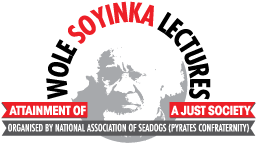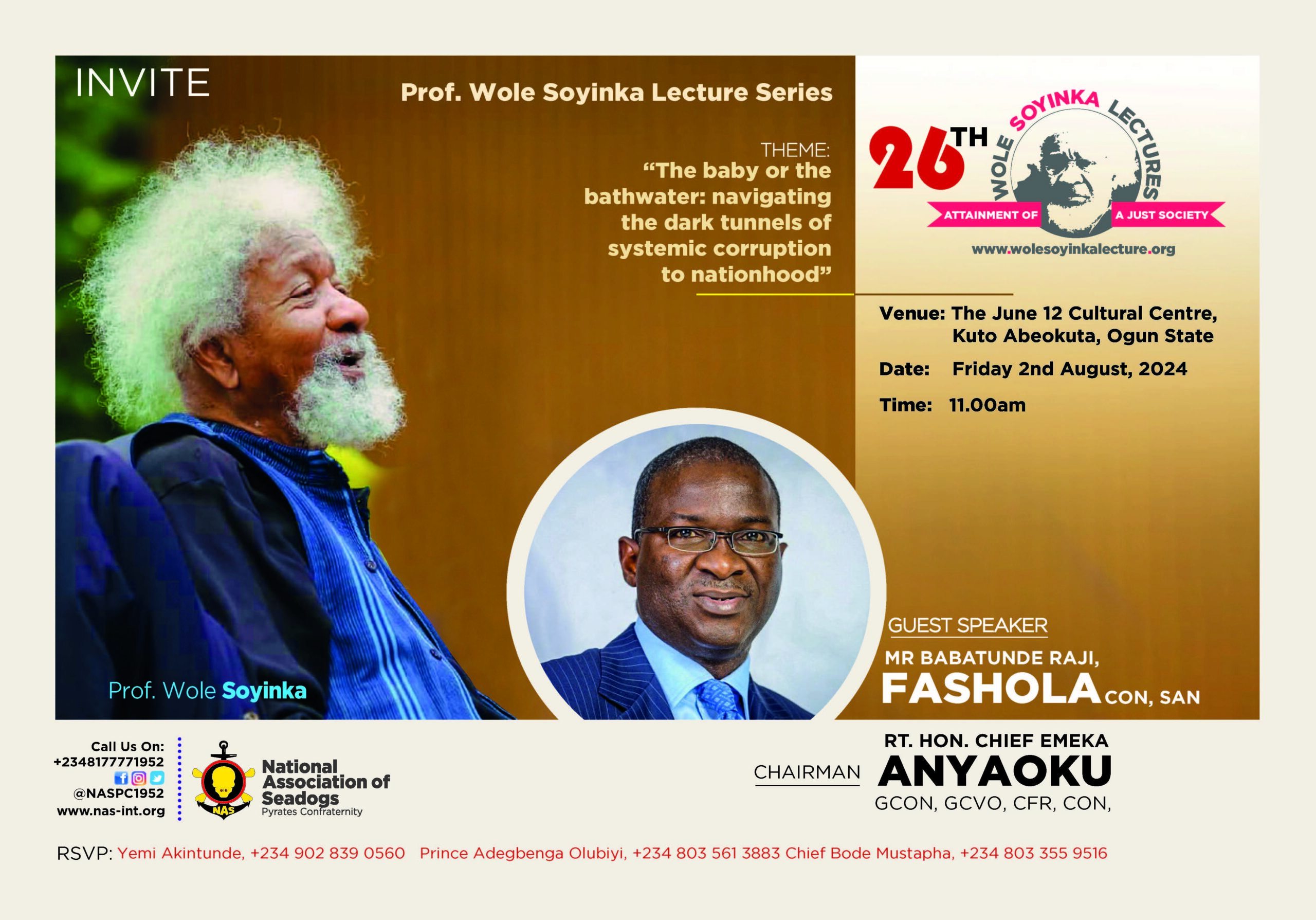26th Wole Soyinka Lecture – The baby or the bathwater: Navigating the dark tunnels of systemic corruption to nationhood
The 26th Wole Soyinka Lecture:
- Guest Speaker: Mr Babatunde Raji Fashola CON, SAN
- Chairman: Rt. Hon. Chief Emeka Anyaoku GCON, GCVO, CFR, CON
- NAS Capn: Mr. Abiola Owoaje
- Date: Friday 2nd August, 2024
- Venue: The June 12 Cultural Centre, Kuto Abeokuta, Ogun State, Nigeria
M
r Babatunde Raji Fashola Senior Advocate of Nigeria was born on June 28, 1963, in Lagos.
A fifth generation Lagosian, the young Fashola obtained his First Primary School Leaving Certificate from Sunnyfields Primary School, Adelabu, Surulere, Lagos before proceeding to Birch Freeman High School also in Surulere. He was also at Igbobi College, Yaba where he completed his Secondary School education and obtained his West African School Certificate.
In pursuit of his dreams, Mr Fashola proceeded to the University of Benin where he earned a law degree in 1987. He was called to the Nigerian Bar In 1988, after attending the Nigerian Law School .
He underwent the mandatory NYSC at the old Bendel State after which he returned to Lagos and commenced his legal career at Sofunde, Osakwe, Ogundipe, and Belgore Law Firm. His law career also took him to K.O Tinubu and Company where as Managing Partner and Lead Counsel, he spearheaded several legal battles in various Courts including the apex Court, Supreme Court of Nigeria.
In August 2004 in recognition of his eminent legal odyssey, he was conferred with the prestigious rank of the Senior Advocate of Nigeria.
An illustrious member of the Nigerian Bar Association, International Bar Association, and Chartered Institute of Taxation of Nigeria, Mr Fashola’s political career began in 2002 when he was appointed Chief of Staff to the then Lagos State Governor, now President of the Federal Republic of Nigeria, Asiwaju Bola Ahmed Tinubu. While as Chief of Staff, he also doubled as the Honourable Commissioner of the governor’s office.
In 2007 after the completion of the tenure of Asiwaju Bola Ahmed Tinubu, Mr Fashola was elected the fourth executive governor of Lagos State. In 2011 due to his sterling performance in office, he was re-elected for another term of four years.
Some landmark projects associated with the high-performing Raji Fashola include the Eko Atlantic City project, the 10-lane Lagos-Badagry Expressway, the expansion of the Lekki-Epe Expressway, Lekki Free Trade Zone, the Bus Rapid Transit System, Lagos Light Rail Project among other people-oriented policies and programmes.
In 2015, after eight years as governor of Lagos State, Mr Fashola was appointed Minister of Works, Power, and Housing by former President Muhammadu Buhari. He held the position from November 2015 to May 28th, 2019. He was reappointed in August 2019 as Minister of Works and Housing serving till May 28th, 2023.
Mr Fashola, author of the book, Nigerian Public Discourse, is a recipient of several awards for his outstanding public service career. Some of these awards include the Governor of the Decade for Peace Award, Yitzhak Rabin Centre for African Development; the Award of Excellence in Leadership, Martin Luther King Junior Foundation; Good Governance Award, IC Publications; Man of The Year, The Guardian, The Vanguard and The Sun newspapers.
Mr Fashola, a devout Muslim and fan of the English Football club, Manchester United is married to Mrs Abimbola Fashola and blessed with children.
Special guests, distinguished, ladies and gentlemen, I present to you the distinguished lecturer of the 26th Wole Soyinka lecture, a direct descendant of the patriarch of the Fashola family in Isalegangan, a descendant of the Shomade family of Isale Eko and a descendant of the Bashua and Suenu families of Lagos, legal luminary and astute administrator, Mr Babatunde Raji Fashola, Senior Advocate of Nigeria.
A
kinwande Oluwole Babatunde Soyinka, playwright, poet, essayist, human rights, and political activist was born on 13th July 1934 in Abeokuta, Ogun State.
For his primary education, he went to St Peter’s Primary, Abeokuta before proceeding to Abeokuta Grammar School, where the seed of a promising literary career was sown with the literary prizes he won from literary competitions.
In 1946, he enrolled at Government College, Ibadan, and after completing his studies, he was admitted into University College Ibadan, in 1952, which was then affiliated to the University of London.
The young Wole Soyinka spent two years at University College Ibadan studying English Literature, Greek, and Western History before proceeding to the University of Leeds in 1954 where he continued his studies of English Literature. In 1957 after the award of a Bachelor of Arts degree, he enrolled for his MA degree also at the University of Leeds.
He would spend six years in England before returning to Nigeria in 1960 from his position as a dramaturgist at the Royal Court in London after being awarded a Rockefeller bursary by his alma mater, University College Ibadan to study African drama.
Prof Soyinka has had an illustrious teaching and writing career spanning seventy years. He has taught at the University of Ibadan, the University of Ife now Obafemi Awolowo University, and the University of Lagos. Outside Nigeria, he has lectured as a Godwin Smith Professor of African Studies and Theatre Arts at Cornell University; a Robert Woodruff Professor of Arts at Emory University; Professor of Creative Writing, Nevada, Las Vegas; visiting Professor at New York University; Loyola Marymount University; Harvard University, Yale University, and Duke University, all in the United States of America. He has also taught at Cambridge and Oxford Universities in England and presently lectures as a Professor of Arts at New York University, Abu Dhabi, United Arab Emirates.
In 1986, Prof Soyinka made history as the first black man to win the Nobel Prize for Literature which in the words of the Committee for the prize was awarded for his “wide cultural perspective and poetic overtones fashioning the drama of existence”.
To date, Prof Soyinka has written 30 plays, eight poetry collections, six memoirs, four novels, three short stories, and scores of essays and scholarly articles.
His plays include The Lion and the Jewel, written in 1959; Trials of Brother Jero written in 1960; Dance of the Forest written in 1960; Kongi’s Harvest written in 1964, The Road written in 1965, Madmen and Specialists written in 1970; Jero’s Metamorphosis written in 1973; Death and the King’s Horseman written in 1975; Opera Wonyosi written in 1977; Beautification of the Area Boy written in 1996; King Baabu written in 2001 and Alapata Apata written in 2011.
His collection of poems includes Telephone Conversation, Idanre, and other poems; A Big Airplane Crashed into The Earth; A Shuttle in the Crypt; Ogun Abibiman; Mandela’s Earth and Other Poems and Samarkand and Other Markets I Have Known.
The bestseller memoirs he has written include, The Man Died written while he was in prison; Ake: The Years of Childhood; Ibadan: The Penkelemes Years and You Must Set Forth At Dawn.
His novels include The Interpreters written in 1965, Season of Anomy written in 1973; Harmattan Haze on an African Spring written in 2012 and Chronicles from the Land of the Happiest People on Earth written in 2021 at the age of 87!
Prof Soyinka is not just an author; he is also an actor and director. He was behind the establishment of the 1960 Masks Theatre group, the Orisun Theatre Group, and the Guerilla Unit.
Known for his fearless spirit and outspokenness against injustice in line with his avowed declaration: ‘’ Justice is the first condition of Humanity’’, the Nobel Laureate began his activism as a teenager when he and six other patriotic Nigerians defied accepted but inherently moribund conventions, and founded the Pyrates Confraternity at the then University College Ibadan. The founding of this milestone organisation was based on the fundamental objective of fighting for the oppressed, speaking up for the vulnerable, and challenging the myriads of societal injustices.
The bold step towards a life of speaking for the voiceless as a teenager prepared him for the life he embraced as the Conscience of a Nation in his adulthood. In 1965, he sneaked into a Radio Station in defence of the people of the Western Region. In 1971, he went to Biafra to meet with Col Emeka Ojukwu in the last bid to stop the Civil War. That singular action earned him prison terms when he returned to Nigeria courtesy of the Yakubu Gowon government.
His time in prison rather than forcing him to backslide from being a soldier of humanity fired him up. At various times in Nigeria, he was at the forefront of demands for justice for the voiceless and good governance for the generality of the people.
In 1993 when the military regime annulled the June 12 Presidential election, Prof Soyinka became the rallying point of civil society groups, activists, and political elements against the military junta. He was forced to go into exile abroad in 1994 and became a thorn in the flesh of the military, rallying the international community against the military in Nigeria.
Outside Nigeria, he was ferocious in his criticism of the Apartheid regime imposed on the people of South Africa. Elsewhere in the world, in Darfur, America, among others, he has been in solidarity with the exploited and the disadvantaged.
In recognition of his literary prowess, service to humanity, and political activism, Prof Soyinka aside from the Nobel Prize is a recipient of several awards at home and abroad.
Some of the honours he has received include the Commander of the Federal Republic from the Nigerian Government in 1986; the Agip Prize for Literature in 1986; the Anisfield Wolf Book Award, United States in 1983; the Benson Medal from the Royal Society of Literature in 1990; Honorary Doctorate, Harvard in 1993.
He is also a recipient of Honorary Doctorate Degrees from SOAS University, London, Princeton University, United States, Cambridge University, and Federal University of Agriculture, Abeokuta. Other awards include the Europe Theatre Prize; International Humanist Award; and Golden Plate Award from the American Academy of Achievement.
As a prophet loved and respected in his community, the Alake of Egbaland, Oba Adedotun Aremu Gbadebo III conferred on him the Chieftaincy title of Akinlatun of Egbaland.
For his outstanding contributions to Humanity, the National Association of Seadogs, Pyrates Confraternity instituted the Wole Soyinka Lecture Series which is in its 26th Edition today.
Special guests, distinguished ladies, and gentlemen, I present to you, author, poet, essayist, playwright, legendary wine connoisseur, Nobel Laureate, and Akinlatun of Egbaland, Prof Wole Soyinka.


